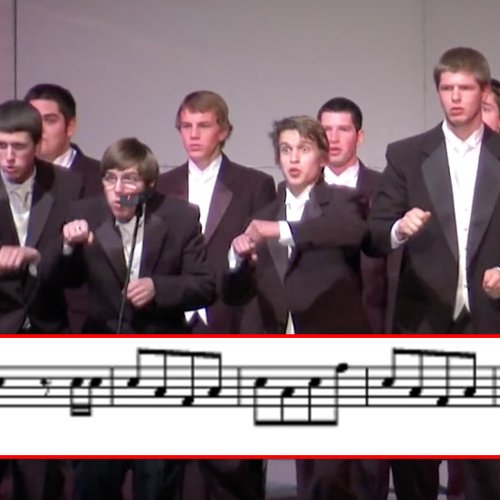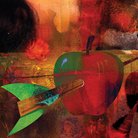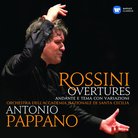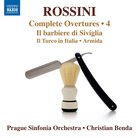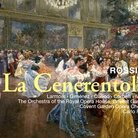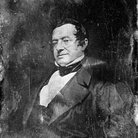Gioachino Rossini: A Life
Operagoers were intoxicated by his frothy comic masterpieces – but at the moment of Rossini's greatest success, the Italian composer stopped writing them.
Rossini was one of classical music’s great bon viveurs. A larger-than-life character with an appetite to match, he earned the admiration and friendship of musicians of the calibre of Liszt, Chopin and Paganini.
Even Wagner, who had hardly a kind word to say for anyone but himself, was completely bowled over by what he described as Rossini’s “narcotising melodic invention”.
For his part, and despite conceding Wagner’s importance as the “voice of the future”, Rossini notoriously quipped that the German’s operas had “beautiful moments, but awful quarter-hours”.
Not everyone was equally intoxicated by the Italian’s scintillating operatic cocktails.
Cesar Cui, spokesman for the group of Russian composers known as “The Five”, felt that after The Barber Of Seville, “the rest of Rossini’s output was merely a feeble and pallid copy”.
Beethoven put it a little more tactfully when he opined that “Rossini would have been a great composer if his teacher had spanked him enough”.
In more recent times, writer and broadcaster Clive James was perhaps not too far off the mark when he succinctly described Rossini as “Mozart without the brains”. Yet, by and large, few would dissent from Mendelssohn’s excited assessment of him as “a genius”.
Rossini was also an expert chef who, judging from his well-rounded physique, enjoyed consuming healthy portions of his culinary masterpieces as much as he did preparing them. Yet whatever his lack of physical agility, his music possesses a refinement, textural transparency and sleight-of-hand flair all of its own.
He was widely renowned as one of the quickest wits in European artistic circles, and the speed at which he composed was phenomenal. He claimed it took him about four minutes to write an aria – about as long as it took to boil himself a portion of rice. Never one to worry unduly about the intellectual rigour of his compositions, Rossini once declared that he would have been quite content setting laundry lists to music.
The composer was born in Pesaro in 1792. His father was a semi-professional trumpeter whose main source of income was as an abattoir inspector. Politically outspoken, Rossini senior once spent a night in jail cooling off following a withering attack on the ruling classes. His mother, Anna, was a talented stage-struck soprano, whose starring roles in a string of comic operas meant the family was constantly on the move.
The young Giachino, who stayed with relatives in Pesaro when his mother was performing on tour, composed his first opera, Demetrio E Polibio, before he was 16.
At this point Rossini was so obsessed with Mozart’s music that his friends at the Accademia Filarmonica in Bologna – the family had moved to the city after a throat ailment forced Anna to retire from performing – nicknamed him “The Little German”.
Rossini then produced a series of sidesplitting one-act farse comiche (Rossini’s own term), climaxing in Il Signor Bruschino (1813), which opens with the most uproarious overture Rossini ever penned.
Not only are the violins instructed to tap their stands with their bows on occasion, but there also a number of indelible repeated sequences that gradually increase in volume, leading to Rossini being popularly dubbed “Signor Crescendo”.
Just three years later and riding on the crest of a wave of popular success, Rossini produced his most famous work, The Barber Of Seville. Difficult as it is to believe today, the premiere was a total flop, largely because one of his composing rivals, Giovanni Paisiello, had also recently produced an adaptation of Beaumarchais’s bubbly farce.
However, it wasn’t long before Rossini’s classic riot of comic intrigue had superseded the earlier adaptation, which has now been almost totally forgotten.
Another of Rossini’s whistle-stop frothy comedies followed a few months later: La Cenerentola, whose unusually wide-ranging emotional terracing embraces some genuinely touching moments along the way.
The title role is brilliantly written, calling upon that most cherished of operatic voices, the coloratura mezzo-soprano, which encompasses notes from the low contralto range right up to the soprano register, always with breathtaking agility.
La Cenerentola is one of Rossini’s longest operas, and many consider it to be his supreme masterpiece.
By 1817, the year in which La Cenerentola was first produced, its composer had become increasingly depressed about the singing standards he regularly encountered in even the finest Italian opera houses: “Whereas in the good old days, players sought to make their instruments sing, now our singers endeavour to handle their voices as though they were instruments,” he moaned dejectedly.
According to a letter he wrote in 1851, things had barely improved over the intervening 34 years. As part of a scathing attack on “interpretation”, he fumed: “It so often happens that a performance becomes distorted, spoiling the ideas of the composer, robbing them of their essential simplicity of expression.”
As far as Rossini was concerned, the musical world had been turned upside down, with composers often being treated as nothing more than opera stars’ lackeys, rather than as the inspired creator without whom singers would quite simply be out of a job.
A year later, Rossini wrote Moses In Egypt, quite possibly the most lethal piece of music ever composed. Dr Cotugno, a reputable Naples physician, reported over 40 cases of women literally dying of excitement or being gripped by nervous convulsions while watching it. According to Cotugno: “This was brought on exclusively by the Jews’ Prayer in the third act, with its extraordinary change of key.”
During the 1820s Rossini’s production-rate slowed dramatically to just one new work a year (at his peak he was used to producing three or four).
Many of these later operas have never gained a regular foothold in the performing repertoire, including such forgotten titles as Maometto Secondo (1820), Matilde Di Shabran (1821) and Zelmira (1822). By the time of Rossini’s final Italian opera, Semiramide (1823), his overtures were no longer merely curtain raisers but also introduced a number of musical ideas that were developed later in the opera.
The dramatic content was invariably more serious, in this case involving the eponymous Queen of Babylon who murders her husband and then unwittingly marries her own son, who later kills her by accident!
During the mid-to-late 1820s, Rossini finally won over the notoriously fickle French public with a series of five works, culminating in 1829 with the ever-popular William Tell.
Then, with the operatic world at his feet eager for his next creation, Rossini laid his theatrical pen to rest forever. To this day, no one knows why, although there have been a number of theories from being financially comfortable enough to stop writing them to mental fatigue. He saw out the rest of his life (nearly 40 years) with a few songs, piano pieces, and two large-scale choral works.
Although he was brought up in the Catholic faith, Rossini was not especially renowned for his religious beliefs, yet his attempts to adapt his instinctively lightweight operatic style to a more profound medium of expression is notable in both his Stabat Mater (1841) and the Petite Messe Solennelle (1863), the latter being scored for the unusual combination of 12 voices, two pianos and a harmonium.
Dismissed by the composer himself as “the last mortal sin of my old age”, such movingly atmospheric passages as the Agnus Dei lay testimony to the essential seriousness of purpose that lay hidden beneath Rossini’s playful public exterior.
For his 70th birthday celebrations in 1862, a number of the composer’s friends clubbed together and (at enormous expense) had a colossal statue built in his honour.
Rossini was deeply touched by their kind gesture, but when he caught wind of the huge costs involved, he mischievously suggested: “Why not give the money to me, and I’ll stand on the pedestal myself?”
Rossini died at his villa in Passy on November 13, 1868, following a short illness. Having initially been buried in Père Lachaise cemetery in Paris (where his original tomb survives), his remains were subsequently moved to Florence in 1887.
He once confessed: “I have only wept three times in my life: the first time when my earliest opera failed, the second time when, with a boating party, a truffled turkey fell into the water, and the third time when I first heard Paganini play.”
But when it came to favourite composers, he invariably returned to his student-day heroes: “I take Beethoven twice a week, Haydn four times, but Mozart every day… Mozart is always adorable.”


